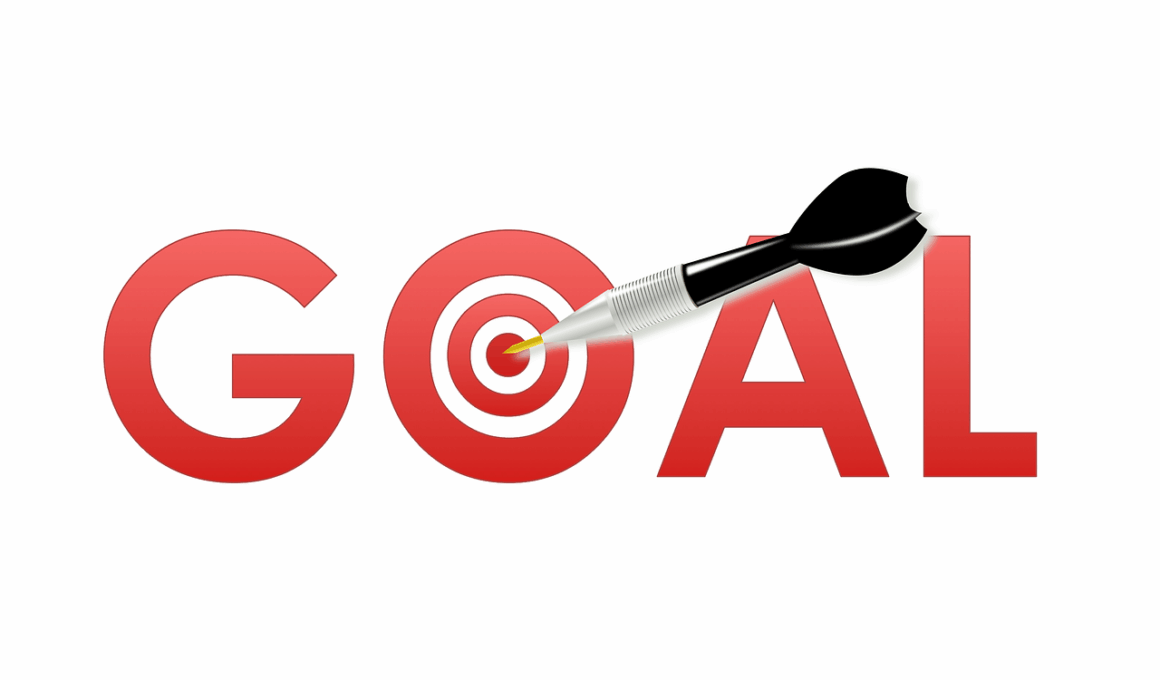Setting Process Goals vs Outcome Goals: What Works Best?
In the realm of sports psychology, understanding the difference between process goals and outcome goals is crucial. Process goals are focused on specific actions, techniques, or strategies that athletes can control directly. For example, a swimmer might set a process goal to improve their stroke efficiency or their flip turn technique. This focused approach enables athletes to monitor their progress and adjust their training methods accordingly. Conversely, outcome goals revolve around the end results, such as winning a competition or achieving a particular time. While these goals can provide a clear target, they often depend heavily on factors outside the athlete’s control, which may lead to frustration if not met. It’s essential to emphasize the importance of setting both types of goals. Athletes who utilize a combination of process and outcome goals report higher levels of motivation and improved performance. By recognizing what they can control, athletes can remain focused on their training efforts while still aspiring to achieve broader competitive success. Hence, a balanced approach leveraging both goal types often leads to more sustained athlete engagement and overall improvement in performance.
The role of effective goal setting in sports psychology cannot be overstated. Successful athletes often highlight that clearly defined goals form the backbone of their training and competitive strategies. When goals are not explicitly outlined, it may become challenging for athletes to track progress or adapt their training routines effectively. Furthermore, setting unrealistic goals can lead to disappointment, potentially diminishing motivation. This makes the act of realistic goal-setting crucial in the pursuit of excellence in sports and athletics. Research indicates that athletes who utilize SMART criteria—Specific, Measurable, Achievable, Relevant, Time-bound—when setting goals tend to perform better and experience increased satisfaction within their sports. An example could be setting a measurable pace for running a marathon instead of simply aiming to finish the race. In addition, utilizing specific checkpoints and deadlines creates a structured pathway to success that fosters motivation—even amidst setbacks during competition. Ultimately, athletes who consciously establish achievable goals, whether process or outcome-based, are more likely to persevere through challenges, focusing on progress rather than mere results. This nurturing of intrinsic motivation propels athletes to hone their skills continuously, leading to overall performance improvement.
The Psychological Impacts of Process Goals
One of the key advantages of setting process goals lies in their intrinsic psychological benefits. Focusing on what they can control allows athletes to develop resilience and maintain a healthy mindset through the ups and downs of training and competition. For instance, when approaching a challenge, an athlete might concentrate on improving their form instead of stressing over achieving a perfect score. This shift in focus can help mitigate the anxiety often associated with expectations from outcome goals. Athletes may feel less pressure when they enjoy the process of their training, making them more open to learning and adaptation. Moreover, achieving small milestones related to process goals can foster a profound sense of accomplishment. Celebrating these smaller wins propels athletes forward and enhances their self-efficacy—the belief in one’s ability to succeed in a particular area. As athletes become more accustomed to recognizing their improvements and capabilities, they are more likely to tackle formidable challenges with confidence. Thus, the psychological impacts from embracing process goals create an empowering feedback loop that translates into not only improved performance but also sustained passion for their sport.
In contrast, the pursuit of outcome goals brings both advantages and risks. Since these goals are often externally focused, they can create a heightened sense of competition among peers. This may initially motivate an athlete to push harder, striving to win or outdo their rivals. However, the external nature of outcome goals may also introduce significant stress levels, particularly when the outcome does not align with expectations. Athletes solely fixated on results may end up overlooking important aspects of their training regimen, neglecting their mental health and overall well-being. For example, if an athlete solely wants to win a championship without enjoying the process of training, they might burn out faster. It is therefore crucial for effective coaching to balance outcome-oriented objectives with maintaining an athlete’s love for the sport. Coaches can encourage athletes to reframe their mindsets, acknowledging that pursuing excellence is just as essential as the final results. This balance recalibrates their focus toward improvement in a manner that supports long-term development, ensuring that athletes remain engaged and motivated throughout their careers.
Combining Both Goal Types
The beauty of goal setting in sports lies in the effective combination of both process and outcome goals. Utilizing a dual approach not only mitigates the risks associated with each goal type but also enhances performance and motivation overall. Athletes who set a mixture of goals not only define what they want to achieve in general terms but also outline specific steps needed to accomplish their aspirations. For example, a tennis player might set an outcome goal to win a tournament while simultaneously focusing on process goals, such as improving their serve percentage and court strategies. This duality keeps athletes working on their skills and competing at their best, creating an ecosystem of continuous growth. Research suggests that athletes with both goal types report significantly higher levels of satisfaction in their sport due to a more balanced perspective. This is because process targets support daily practice and effort, while outcome milestones validate their hard work and skill development. Such interdependence ensures that the journey toward athletic triumph becomes a fulfilling experience, marked by learning, growth, and enjoyment.
Moreover, utilizing both goal types allows for effective reflection and adjustment during the training process. By consistently evaluating their progress in relation to both outcome and process goals, athletes can make informed decisions on what aspects of training to focus on. This adaptability nurtures resilience, as athletes recognize that achieving a certain result may require intermittent reassessment of their strategies and data. For instance, an athlete who realizes their technique needs adjustment in order to meet a performance standard can take proactive steps to modify their approach. Incorporating ongoing reflection in conjunction with goal setting has been shown to inspire a proactive mindset, whereby athletes take ownership of their journey. Thus, this practice reinforces the importance of dedicated training sessions along with celebrating milestones when they meet specific process goals. To realize success, especially in highly competitive settings, athletes need to embrace the shifting dynamics surrounding their performance. Ultimately, combining process and outcome goals cultivates an environment that supports lifelong learning and a passion for sports.
The Balance between Achievement and Enjoyment
In summary, the landscape of sports psychology reveals that understanding and effectively utilizing both process goals and outcome goals is essential for athletes striving for excellence. The relationship between these two goal types is not merely additive, but interactive. Athletes who adopt both strategies cultivate an empowering framework for their training, allowing them to develop skills while simultaneously aiming for significant outcomes. This balance between achievement and enjoyment is pivotal in maintaining long-term engagement in their sports journey. Importantly, by setting process-oriented objectives, athletes reinforce the value of enjoying the journey rather than solely fixating on the results. Achieving a satisfying blend of both types promotes perseverance, emphasizes skill acquisition, and fosters intrinsic motivation, all while continuing to aspire for competitive success. Therefore, a balanced approach empowers athletes to rise to challenges with confidence, as they acknowledge that their performance is as much about the process as it is about results. Ultimately, embracing this comprehensive perspective may serve as the cornerstone of a productive athletics career, epitomizing the fundamental purpose behind sports—personal growth and the love of competition.
As we continue to explore deeper understandings in sports psychology, it becomes increasingly clear that goal setting functions as a fundamental element for athletes across various disciplines. The intricate dynamics between process and outcome goals provide a comprehensive framework for developing both performance and well-being. By fostering an environment in which athletes feel supported, motivated, and engaged, coaches and sports psychologists play a pivotal role in shaping athlete experiences. Whether investigating motivation, performance enhancement, or mental resilience, the integration of both goal types fosters an understanding of what drives excellence. In a society that pressures results, the reminder to appreciate the journey encapsulated by process-oriented objectives is vital. Therefore, athletes and coaches are encouraged to not only set specific, measurable goals but also to enjoy the process along their journey. This perspective cultivates a more balanced approach not only in sports but throughout life itself. Embracing these principles can lead to not just achievements, but richer experiences that foster a deeper connection to the physical, mental, and emotional aspects of sport. As conclusions draw from this exploration, let the journey itself remain, above all, a celebration of achievement and enjoyment.


